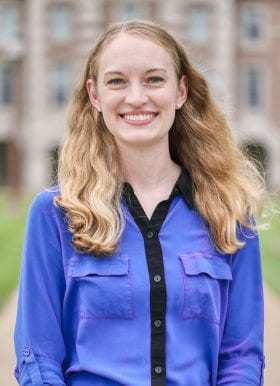
Laura Fischer
Career Lessons from UNandUP
My name is Laura Fischer, and I am a 4th-year Ph.D. student studying Developmental Biology at Washington University in St. Louis. I had the privilege of working at UNandUP, a biotech startup using magnets to noninvasively maneuver medical devices throughout the body. Now, as I transition back to my thesis work full time, I want to reflect on the lessons I learned from some remarkable mentors and my own explorations. This letter is written to my future self so that I may remember these important notes before every career transition.
Dear Future Self,
The job-hunting process can be stressful, scary, long, and full of uncertainty. It may be tempting to jump on the first job that gives you a real offer. Before making a final decision, I kindly urge you to remember these lessons you learned while working at UNandUP:
- The mentor is as important, if not more important, than the project itself. Every first-year Ph.D. student is pressed with the task of finding the right lab and mentor. As it turns out, this is also critical for industry positions. Thankfully at UNandUP, you had Mike and the team. Mike conducted weekly one-on-one meetings with each intern that focused on an aspect of entrepreneurship, such as risk, adversity, and creating your own opportunities. Mike’s big takeaway was that you should always be looking for your next job (see point 3). So, before accepting any position, ensure there are mentors who understand and will enable your professional and personal growth. The project should be a good fit, but the people are what will make or break the experience.
- Surround yourself with people who are smarter than you. It can be intimidating walking into a room feeling like you are the least knowledgeable person on the subject matter. However, that means you have the greatest opportunity for learning. Put yourself in these positions as often as possible to maximize your personal growth. At UNandUP, Duke knew more than anyone about writing grant proposals. Walter was an excellent software engineer. Dave handled quality assurance. Peter talked business with investors. Mike propelled R&D projects. Look for a diverse team such as this at your future job to grow your personal skillsets and network of resources. Start building your web of “people who are smarter than you” on day one (or before) and do not stop.
- Always be looking for your next job. Life is uncertain, especially in a startup. You may be doing something one day and something completely different the next. To thrive in this environment, it is important to keep an open mind about projects, company direction, and your own career path. Mike taught you to accept every interview that comes your way for two reasons. First, interviewing is a skill, and like any skill, it takes practice. The more you do it, the better you will become (and you will need to do it throughout your life). Second, you never know where the interview might take you. It could lead to a wildly fruitful endeavor. At the very least, you will broaden your network and have learned something about a novel invention, business strategy, or company culture. You will be in a better position than you would have been otherwise.
Good luck on every career search,
Laura Fischer